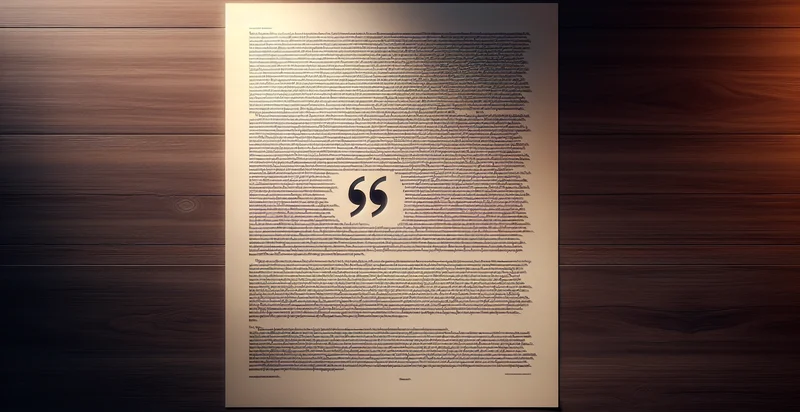Identify if a text contains a quotation mark
using AI
Below is a free classifier to identify if a text contains a quotation mark. Just input your text, and our AI will predict if it contains a quotation mark - in just seconds.

Contact us for API access
Or, use Nyckel to build highly-accurate custom classifiers in just minutes. No PhD required.
Get started
import nyckel
credentials = nyckel.Credentials("YOUR_CLIENT_ID", "YOUR_CLIENT_SECRET")
nyckel.invoke("if-a-text-contains-a-quotation-mark", "your_text_here", credentials)
fetch('https://www.nyckel.com/v1/functions/if-a-text-contains-a-quotation-mark/invoke', {
method: 'POST',
headers: {
'Authorization': 'Bearer ' + 'YOUR_BEARER_TOKEN',
'Content-Type': 'application/json',
},
body: JSON.stringify(
{"data": "your_text_here"}
)
})
.then(response => response.json())
.then(data => console.log(data));
curl -X POST \
-H "Content-Type: application/json" \
-H "Authorization: Bearer YOUR_BEARER_TOKEN" \
-d '{"data": "your_text_here"}' \
https://www.nyckel.com/v1/functions/if-a-text-contains-a-quotation-mark/invoke
How this classifier works
To start, input the text that you'd like analyzed. Our AI tool will then predict if it contains a quotation mark.
This pretrained text model uses a Nyckel-created dataset and has 2 labels, including Contains Quotation Mark and Does Not Contain Quotation Mark.
We'll also show a confidence score (the higher the number, the more confident the AI model is around if it contains a quotation mark).
Whether you're just curious or building if a text contains a quotation mark detection into your application, we hope our classifier proves helpful.
Related Classifiers
Need to identify if a text contains a quotation mark at scale?
Get API or Zapier access to this classifier for free. It's perfect for:
- Content Moderation: In online forums and social media platforms, identifying quotes can help moderators quickly assess user-generated content. By flagging text that contains quotation marks, moderators can efficiently review discussions for policy violations or misinformation that is often encased in quoted material.
- Sentiment Analysis: Businesses can utilize text classification to analyze customer feedback and reviews that include specific quotes. By isolating mentions in quotation marks, data scientists can better understand sentiments and themes in customer opinions that may directly impact brand perception.
- Market Research: In qualitative research, quotes from participants are crucial pieces of data. By identifying text with quotation marks, researchers can efficiently compile and analyze participant insights, enabling them to derive actionable strategies or improve product offerings based on direct customer feedback.
- Legal Document Review: Legal professionals can employ this classification function to scan through large volumes of documents for quoted statements, such as depositions or witness accounts. This helps streamline the review process by efficiently pinpointing critical evidence and testimonies that may be relevant to ongoing cases.
- Academic Research: In academic writing and literature reviews, researchers often quote existing studies. This text classification allows scholars to easily identify and extract relevant citations from various documents, ensuring accurate referencing and proper integration of scholarly discourse.
- Social Media Listening: Brands can analyze social media conversations for direct quotes that customers mention in their posts. By identifying these quotes, companies can engage with their audience more effectively, tailoring responses based on actual sentiments expressed in the conversations.
- Chatbot Interaction Enhancement: Chatbots can improve user experience by recognizing when users provide feedback or ask questions that include direct quotes. By identifying these key phrases, chatbots can offer more contextual and relevant responses, ultimately leading to more satisfying user interactions.


